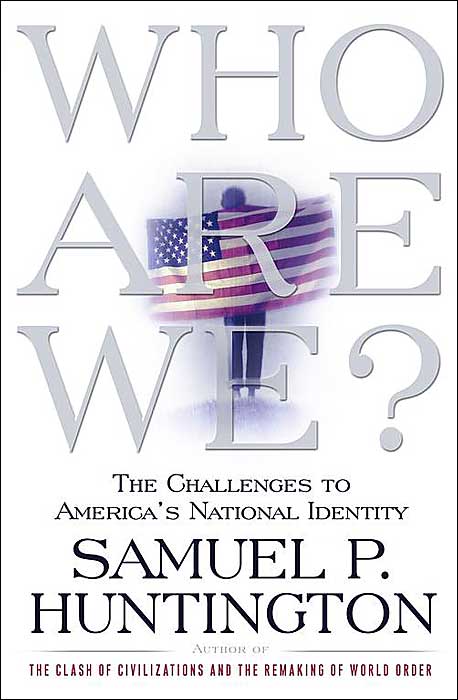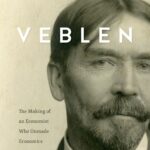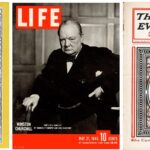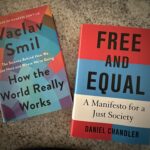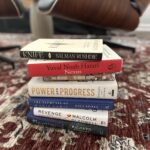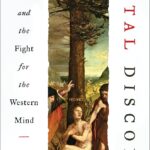Here individuals of all nations are melted into a new race of men, whose labours and posterity will one day cause great changes in the world.
—J. Hector St. John de Crèvecoeur,
Letters from an American Farmer, 1782
The one absolutely certain way of bringing this nation to ruin … would be to permit it to become a tangle of squabbling nationalities.
—Theodore Roosevelt, Autobiography, 1913
Democratic civilization is the first in history to blame itself because another power is trying to destroy it.
—Jean-François Revel, 1970
The delicate task that faces our civilization today is not to reform the secular, rationalist orthodoxy, which has passed beyond the point of redemption. Rather, it is to breathe new life into the older, now largely comatose, religious orthodoxies—while resisting the counterculture as best we can, adapting to it and reshaping it where we cannot simply resist.
—Irving Kristol, “Countercultures,†1994
Who are we? It’s a question posed in the new book of the same title by Samuel Huntington. The above quotes were part of an introduction to a book review by Roger Kimball in the June issue of The New Criterion (OK, I admit to being a bit behind on reading). The do a nice job of setting the stage to talk about Huntington’s subject matter, which to say the least is timely in our national debate.
If you are unfamiliar with Huntington, he is a Harvard political scientist know for his earlier work “The Clash of Civilizations and the Remaking of the New World Order.” Huntington seems to be writing ahead of the curve. The subject matter of his previous book seems to be playing out in front of our eyes. What’s on his mind now? How will the results of Sept. 11 affect us as a nation comprised of immigrants? What will it do to our values? What in our history as a nation do we seem to be forgetting?
“The widespread sense of condign outrage—of horror leavened by anger and elevated by resolve—testified to a renewed sense of national purpose and identity after 9/11,” writes Kimball. “Attacked, many Americans suddenly (if temporarily) rediscovered the virtue of patriotism.” However, as Kimball notes, there are anecdotes of our unity on the wane. (Just watch any footage from the presidential campaigns, and that should convince you should you disagree.) Has, as Kimball writes, our excess of flag-waving been “followed by a relapse into indifference”?
“Does it mean that the sudden upsurge of patriotism in the weeks following 9/11 was only, as it were, skin deep? Or perhaps it merely testifies to the fact that a sense of permanent emergency is difficult to maintain, especially in the absence of fresh attacks,” says Kimball. “Is our sense of ourselves as Americans patent only when challenged? “Does it,†Huntington asks, “take an Osama bin Laden … to make us realize that we are Americans? If we do not experience recurring destructive attacks, will we return to the fragmentation and eroded Americanism before September 11?â€
America is a verb. (How’s that for a catchy slogan for a T-shirt? But stay with me.) I think to be an American, you have to want it. I think that each citizen must define what that means for themselves, and then act on it. I think you will have to agree that there have never been any great Americans who have not done this for themselves personally. Collectively, each generation must define what has gone before, and set the course for the future.
“To get a sense of what has happened to the institution of American identity, compare Robert Frost’s performance at John F. Kennedy’s inauguration in 1961 with Maya Angelou’s performance thirty-two years later,” writes Kimball. “As Huntington reminds us, Frost spoke of the “heroic deeds†of America’s founding, an event, he said, that with God’s “approval†ushered in “a new order of the ages.†By contrast, Maya Angelou never mentioned the words “America†or “American.†Instead, she identified twenty-seven ethnic or religious groups that had suffered repression because of America’s “armed struggles for profit,†“cynicism,†and “brutishness.â€
Surely, if we don’t sew up the divide in this country, our future could be at stake. As Huntington deftly puts it in his book: “The traditional ideal of a distinctive American identity, forged out of many elements but unified around a core of beliefs, attitudes, and commitments is now up for grabs.
“Huntington suggests, the United States is not only undergoing a profound identity crisis,” writes Michiko Kakutani in a May review of the book in the New York Times, but it may eventually find its very existence threatened: ”Historically the substance of American identity has involved four key components: race, ethnicity, culture (most notably language and religion), and ideology,” he writes. ”The racial and ethnic Americas are no more. Cultural America is under siege. And as the Soviet experience illustrates, ideology is a weak glue to hold together people otherwise lacking racial, ethnic, and cultural sources of community. Reasons could exist, as Robert Kaplan observed, why ‘America, more than any other nation, may have been born to die.’ ” Sure enough, Huntington points out that “it is hard to avoid thinking that a people that has lost the will to reproduce or govern itself is a people on the road to destruction.”
Even the very subject matter of our unity is surely to be a point of divisiveness. Some may use the argument to speak against diversity (as Kristol’s quote against counterculture implies). Some may use Huntington’s book as a call for a return to some fictitious “good old days”–perhaps in a couched argument against diversity– when everyone believed the same beliefs, went to the same church. But many who believe this fail to understand that when and where many of these beliefs were formed, particularly in agrarian communities in the nation’s heartland, many individuals in such communities were in the same economic boat. (Maybe this is why this type of thinking plays well in the so-called red states). On the opposite side of the argument, some may correctly point out that our nation is made up of many voices, but that we often fail to define any mutual responsibility.
As I said earlier, you’ve got to want it. To me, in many respects, there is no more noble personification of an American than the recent immigrant. Often driven in search of economic opportunity, an immigrant has an idea of what America means long before setting foot on our soil. In return for citizenship in the land of freedom and opportunity, a bond between citizen in country is formed at the soul’s core. And communities are built with that kind of spirit. Perhaps those born to inherit what the Founders gave us take it for granted.
Some would argue that community, culture, etc. are certainly more easily created when we all look the same, go to the same church to worship the same God–settlers carving cities out of the open prairie. Perhaps. But it’s a bigoted world view to look to your neighbor of different heritage, religion or race and not reach out together toward what you have in common: American citizenship. A country where all are allowed the “opportunity” to raise a family, to earn a wage, to pray to God, or even to paint our hair purple if we like.
So how do we react? How do we assert ourselves? Maybe when we understand that what we cherish most is our freedom and opportunity we won’t work so hard, or vote, to define what shape it takes for others. By reaching out to others, we will preserve that opportunity and with any luck it will remain long into the future. Samuel Huntington surely has me thinking, and I haven’t even finished his book yet.
Maybe that’s why I liked so much what Barack Obama had to say at the Democratic National Convention this week. “If there’s a child on the south side of Chicago who can’t read, that matters to me, even if it’s not my child. If there’s a senior citizen somewhere who can’t pay for her prescription and has to choose between medicine and the rent, that makes my life poorer, even if it’s not my grandmother. If there’s an Arab American family being rounded up without benefit of an attorney or due process, that threatens my civil liberties.”
As Kimball writes in his review of “Who Are We?” perhaps “Benjamin Franklin got to the nub of the matter when, more than two hundred years ago, he observed that “We must all hang together or assuredly we shall all hang separately.—

